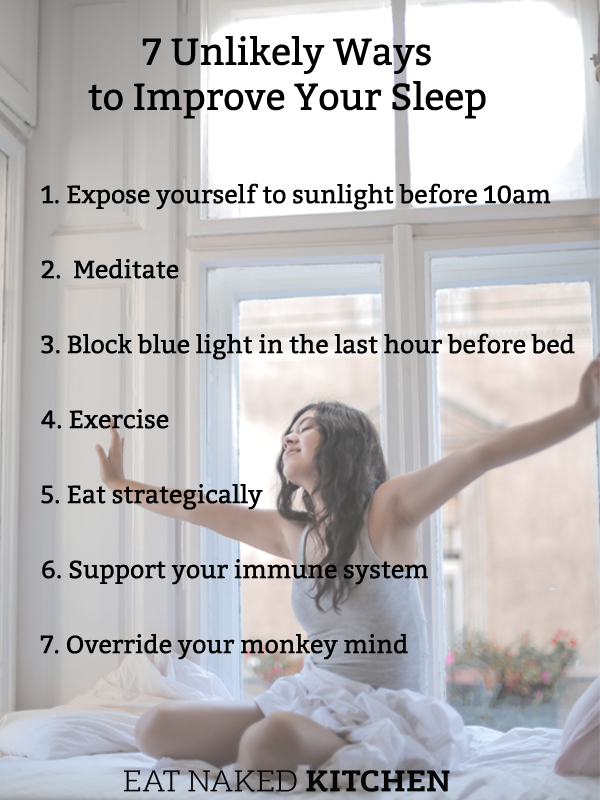It’s 2:30am. I’ve just been up with the baby, and now I’m wide awake and can’t get back to sleep. I’m huddled in the living room with a flashlight reading Arianna Huffington’s new book, The Sleep Revolution. I call it research; my husband calls it torture.
I’ve been obsessed with sleep lately.
This is no surprise. I haven’t truly had a good night’s sleep since my first daughter was born, over four years ago. She’s a lot of amazing things, but a good sleeper isn’t one of them. Now, with a newborn in the house again, I’m fully back on night patrol and feeling it. Hard.
You don’t know what you’ve got ‘til it’s gone.
I have to confess that when my friends without children, or those with children who actually sleep, complain about being tired I want to punch them in the nose. Before having children I was guilty of this as well, but now I realize I had no idea what tired actually feels like.
The benefits of sleep are many and the downsides of getting too little just as plentiful. After reading The Sleep Revolution, I’m more attuned than ever to how powerful it is. It saddens me how much our culture demonizes sleep and celebrates those who survive on very little of it.
There is not a function in the body that doesn’t benefit from a good night’s rest, and that isn’t likewise compromised without it:
- Immune function
- Memory, learning and cognitive function
- Mood and outlook on life
- Decision making
- Weight and metabolism
- Recovery and healing
- Even our skin reflects how well we’ve slept
Here’s a shocking statistic I learned from this book: The incidence of death from all causes goes up by 15 percent when we sleep five hours or less per night. (Huffington, The Sleep Revolution, p 26)
And so: my obsession with all things sleep.
A lot of the factors affecting my sleep are out of my control, so I’m in search of any possible way to milk every last drop of the sleep I do get. When I look at my own health and what elements are most important to maintaining it, sleep is absolutely top of the list. I prioritize it over pretty much all other evening activities, and am in bed shortly after my daughters go to sleep, and I strive for a sleep opportunity of at least 8 to 9hrs (sleep opportunity is the time you’re actually in bed, ready and willing to sleep).
In addition to maximizing the time I’m actually in bed, here are some of the more unusual strategies that have made the biggest difference in my quality of sleep:
1) Expose yourself to sunlight before 10am.
We don’t often think of what we do in the morning as influencing what happens at the end of the day, but it makes a significant difference. When we get outside in the morning, we are establishing our circadian rhythm, letting our body know that it’s time to be awake, which then sets the stage for when it’s time to be asleep. This works whether the sun is out or not, and studies [1,2,3] show the timing of that sun exposure plays an important role in maintaining regular circadian rhythm.
My strategy for this is to take the dog on a morning walk or get out for a morning run. It hits a lot of points all at once: getting outside, getting movement, getting some decompression time. Bonus that it supports my sleep as well.
2) Meditate.
I’ve written about meditation before and how powerful it has been at alleviating stress in my life. We all know that our stress levels have a direct impact on our ability to calm down enough to actually sleep, and one of the best ways to mitigate this stress is meditation. The more consistently we meditate, the more we increase our capacity to handle stress, the less that stress negatively impacts our sleep.[4]
Meditation takes many forms and it doesn’t have to be your standard sitting meditation. Maybe it’s a walk in nature, or sitting outside, or – for me – it’s often my run without music, company, or a podcast to listen to: just my breath, the fresh air, and the rhythm of my feet.
Nor does it have to be a specific length to be helpful. I often encourage clients who’ve not meditated before to start at 5 mins a day. We all have 5 minutes, right? Once they’ve locked in the habit, they can increase the time. But being over-ambitious and trying to add in 20 or 30 or even 60-minute meditations right off the bat is a recipe for disaster.
3) Block blue light in the last hour before bed.
I don’t know how sexy YOU look en route to bed, but check this out:

Yeah, I know. You’re jealous, right? (Oh my lucky husband.)
Anyhow, key things featured in this spectacular photo are my eye shades and even more importantly, these sexy blue light-blocking glasses I had to include them here.
Now, this is very important: these are not just ANY blue light blocking glasses. These are Twilights from True Dark. Not only do they block the blue light, they also block the purple and green and polka dot striped light (just making sure you’re paying attention) and trust me when I say, these things work. I used to use some cheap ones I got off of Amazon, and they were okay, but these literally knock me out within 30 minutes of wearing them, max. In fact if I’m reading a book I actually want to read, I don’t wear these until I’m near the end of the chapter. They’re that good.
Blue / purple / green light inhibits the production of melatonin, our primary sleep hormone.[5,6] With the prevalence of all the screens in our lives from TV to smartphones and everything in between, these glasses are a must. It’s house rule here to wear them in the last 30-60 minutes before bed, even if we’re not on screens. If I can’t get back to sleep after waking up in the middle of the night, I’ll pop these on before sneaking away to read for a bit. They make a huge difference!
4) Exercise.
Moving your body is one of the best ways to ensure you get a good night’s sleep.[7,8,9] Anyone with kids knows this. Tire them out with a good play outdoors and they sleep beautifully. Leave them inside with minimal activity and they’ll be much harder to get to bed. Does it matter when you exercise? Yes and no. It’s ideal to exercise in the morning (go for a run outside on waking so you get a two-fer like I suggested in #1 above), but it’s better to exercise at some point than to not exercise at all. Be mindful of not exercising within 2-3 hours of going to sleep, though. Your heart rate and body temperature both increase, which are the exact opposite of what you want to cue your body that it’s time for bed.
5) Eat strategically.
I can’t tell you how many client sessions I’ve had where they are amazed at how their sleep improves with dietary changes. Eating for good sleep is all about managing your blood sugar levels and minimizing stimulants. The basic rules are: no caffeine after 2pm, no alcohol (that night cap might help you fall asleep, but it won’t keep you there), and no sugar.[10] Not even the “natural” stuff. Eat your last meal at least 3 hours before going to bed so that you don’t have food sitting in your stomach.
However, if you’re someone who wakes in the night and can’t get back to sleep, then have a spoonful or two of nut butter – almond, coconut, cashew, etc – right before going to bed to keep you satiated through the night.
6) Support your immune system.
Yes, we know that sleep is vital for proper immune function and that relationship goes both ways: your immune system also affects your sleep. This is because your immune system is most active at night, and if your body is fighting something – whether that be something you’re aware of like a cold, or some low-lying infection you’re not aware of – it can actually wake you up at night. The best way to handle this situation is to support your immune system. Curious if your body is fighting something you’re not aware of? That’s where functional testing comes in.
7) Override your monkey mind.
I’m someone who has forever been deeply opposed to video games, so it’s hard to believe I’m about to make this recommendation. Anyone I’ve dated knows that seeing a grown man play a video game is an absolute libido-killer for me. That said…
Research on PTSD victims shows that when their brain is stimulated by strongly visual video games, it can override the obsessive replaying of traumatic images (which is the part of PTSD that is most traumatic – the inability to shut off that replay). I learned this from a fascinating interview with Jane McGonigal, author of Reality is Broken: Why Games Make us Better and How They Change the World. She explained how visually overstimulating games like Tetris and Candy Crush Saga override that ability to obsess and replay traumatic or stress-inducing incidents.
As someone with an over-active obsessing monkey mind, I decided to give her recommendation a try. On the way home from a less-than-fabulous speaking engagement I was replaying, dissecting, and beating myself up about, I pulled out my phone and turned on Tetris. I played for about 15 minutes and then tried to nap. To my astonishment, little colored squares, L-shapes, and sticks were all that was in my mind. I could recollect the speaking gig, but I couldn’t obsess. The result: I actually fell asleep and felt about a hundred times better about everything (even the gig) when I woke up.
This is now one of my secret strategies. If I’m up in the night obsessing over something, I whip out my trusty blue-light blocking glasses and play a few rounds of Candy Crush Saga, and next thing you know, my eyes are closing up and I’m back to sleep.
What are the ways you find most helpful to your sleep? Please share in the comments below.





Awesome post with great ideas! I love the Tetris idea 🙂
Try it, Janelle, and let me know how it works for you! xo
Awesome info, as usual, Margaret! I just got some of those a sexy glasses, too. I am so surprised about the video games. That is fascinating! I’m going to have to apologize to my mom for giving her such a hard time about her late night Tetris playing!
🙂 I know! I feel like I need to write a bunch of ex-boyfriends apology letters 😉
Awesome tips…the video game one is especially fascinating! P.S. Thanks for not punching me in the face during our visit 😉
hahahahaha…. you’re welcome 🙂
My heart goes out to you, Margaret. My kids are really spread out so It took many years before I had a full night’s sleep again. It does happen! Those days, weeks, months of brain fog are really tough. These days, I don’t have little ones waking me up, but I still have a hard time turning off the busy brain. I’m often tempted to talk about those difficult problems I haven’t had time or ability to solve during the day. To combat this habit, I came up with a non-video game that really works for me. It can be done alone but works better for me if done with a partner. You pick a category like famous actors or book titles, or squishy things. Start with the letter “A” and take turns naming a thing in the category that starts with the next letter in the alphabet. We try to come up with a new category each time. Last night was medical terms. Not a great choice…(probably precipitated by the fact that we we were doing research, trying to figure out if Scott has shingles…he does : ( We had to do a second round: Things you would find in a zoo. We were asleep by “Y” Well, I was, anyway. Scott doesn’t suffer from busy brain syndrome, but plays this nightly game with me because he loves me and knows it works better if he plays too. (And he doesn’t have to listen to me obsess at bedtime). If I do it by myself, my mind can still wander and obsess.
I love that game, Wendy! Thank you for sharing. Will try it!!
We need a sound sleep to see a healthy morning. Exercising is very important for a good sleep at the end of the day. If your mind is working in a peaceful manner means your mind is ok, but that only can be done by mediation.
Fully agreed with your points.